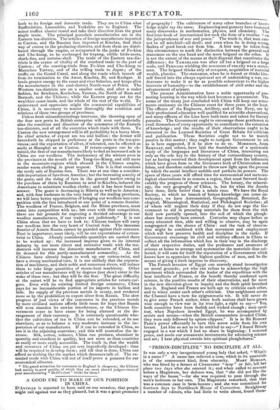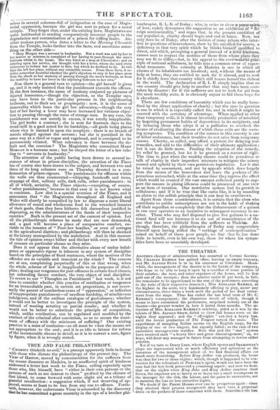"PRISON-DISCIPLINE" NO DISCIPLINE AT ALL.
IT was only a very inexperienced young lady that asked, "What's in a name ?" A name has relieved a case, which in its essentials is of the commonest kind, from obscurity. MARY MORGAN, who was hired by a farmer at Cirencester " mop " or fair, left her place two days after she entered it ; and when called to account before a Magistrate, her defence was, that "she did not like the ways of the house "—for she was required to pass through the men's bedroom to her own. The Magistrate remarked, that that was a common case in farm-houses ; and she was committed for fourteen days to Northleach House of Correction. Straightway a number of editors, who had little to write about, found them-
i
selves n several columns-full of indignation at the case of Magis- terial oppression, because the girl was sent to prison for a moral scruple. They forgot that, under the existing laws, Magistrates are quite habituated to sending comparatively innocent people to the degradation and contamination of a prison for trifling faults. An- other zealous person, who dates a letter to the Morning Chronicle from the Temple, looks further into the facts, and ascertains some- thing on the other side- .. Mary Morgan was a servant in husbandry. Not a word was said by her to her master or mistress in complaint of her having to pass through the men's bedroom whilst in the house. She was hired at a mop at Cirencester; and on entering upon her service, she brought with her a lover, whom she used every endeavour to induce her master to hire, but which he declined to do. In two days she left her place, without any ostensible reason. From these facts, it re- mains somewhat doubtful whether the girl's objection to stay in her place arose from the shock to her modesty of passing through the men's bedroom, or from the inability to have her lover in the adjoining bedroom to her own."
Now there is a general turn to opinion—the girl herself is given up, and it is only insisted that the punishment exceeds the offence. In the first instance, the name of modesty conjured up pictures of injured innocence,—though the objection, as the Templar says, may have been to the particular persons in the neighbouring bedroom, not to their sex or propinquity : now, it is the name of immorality which loses the girl her advocates,—though the very fact of her having a lover may have increased her virtuous objec- tion to passing through the room of strange men. In any case, the punishment was not merely in excess, it was totally inapplicable. The girl broke a contract ; she is sent for fourteen days to the tread-mill in a gaol noted for its hardships,—all gaols being places where vice is burned in upon the neophyte : there is no breach of morals alleged against the servant ; but she is punished in the same way as a thief or rogue and vagabond, and is consigned to be permanently vitiated. What relevancy is there between the de- fault and the coercion ? The Magistrate who committed MARY MORGAN iS a humane man ; but he obeyed the letter of a law rela- ting to "servants in husbandry."
The attention of the public having been drawn to several in- stances of abuse in prison-discipline, the attention of the Times has of course also been drawn to the subject, and between two and three of its long columns were on Thursday devoted to a con- demnation of prison-rigours. The punishments for offences within the walls are thus enumerated—whipping, handcuffs and irons, stoppage of diet, solitary cells, dark cells, other punishments : to all of which, seriatim, the Times objects,—excepting, of course, "other punishments," because in that case it is not known what to condemn. Low diet is a special aversion of the Times, and it announces that "the Magistrates throughout all England and Wales will shortly be compelled by law to dispense a more liberal allowance of sound and wholesome food to the wretched inmates of their gaols, than they have hitherto felt themselves justified in dispensing, as the administrators of the funds of their respective counties." Such is the present set of the current of opinion. Let all the philanthropic reforms be made that are now demanded, and a gaol will become a place of comparative comfort, en- viable to the inmates of "Poor-law bastiles," or even of cottages in the agricultural districts ; and philanthropy will then be shocked at the luxury monopolized by the malefactor. And in this manner the tide of opinion sways hither and thither with every new breath of censure on particular abuses as they arise.
Does it not appear that the alternative abuse of undue indul- gence or oppressive rigour is inherent in any system of discipline based on the principles of fixed sentences, where the motives of the offender are as variable and transient as the winds ? The censors are at sea, complaining perpetually of this or that wrong, when the whole scheme of law is inapplicable to the purposes of disci. pline; dealing out vengeance for past offences in certain fixed classes, but unheeding future conduct, the very object of real discipline. To revert to our "Thoughts on Punishment" last week, is it not time to consider whether this practice of retribution or vengeance for an irremediable past, in certain set proportions, is not neces- sarily the parent of numberless cases of "oppression," or infliction of inappropriate punishment—of needless hardship, of mischievous indulgence, and of the endless catalogue of gaol-abuses ; whether n would not be better to investigate the principle of the system, instead of wasting scrutiny on partial results; and whether it would not be better to substitute the principle of compulsion, which, unlike retribution, can be regulated and modified by the conduct of the criminal after conviction, so as to secure the maxi- mum of efficacy with the minimum of suffering ? Our existing practice is a mass of confusion—as all must be when the means are not appropriate to the end; and it is as idle to labour for reform of the innumerable abuses in detail, as it is to correct a sum, figure by figure, When it is wrongly stated.



























 Previous page
Previous page